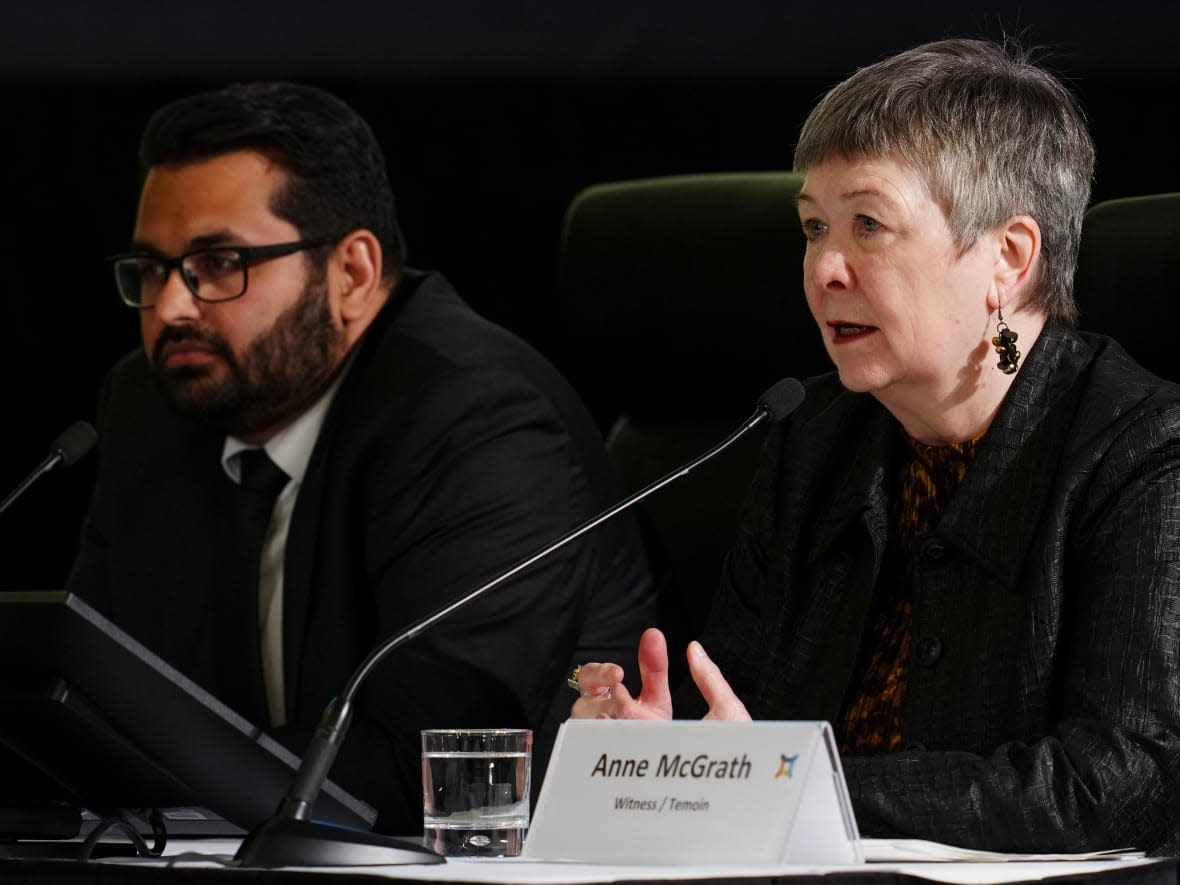Party officials tell foreign interference inquiry 2021 security briefings were not helpful

Federal political party directors say that while they received foreign interference briefings from security and intelligence agencies before and during the 2021 federal election, the information they received was rudimentary and unhelpful.
Three party officials — Walied Soliman, Conservative campaign co-chair for the 2021 election; Azam Ishmael, who led the Liberals' 2021 campaign; and NDP national director Anne McGrath — made the comments while testifying before the Foreign Interference Commission Tuesday.
Soliman said he had to go through an extensive security clearance process in order to represent his party at the Security and Intelligence Threats to Elections (SITE) Task Force briefings. He said they failed to deliver anything new.
"My overall sense was that I really didn't learn anything in the briefings that I didn't regularly read in the New York Times or the Globe and Mail or the Toronto Star," he said.
"Listening to briefings on things that I think … were probably not actionable and … entirely known to use was not a good use of time and probably not a good use of resources."
The Foreign Interference Commission inquiry, led by Quebec judge Marie-Josee Hogue, expects to hear testimony from more than 40 people, including community members, political party representatives and federal election officials.
Han Dong, who now sits as an independent MP, left the Liberal caucus after it was alleged he willingly participated in Chinese interference efforts and won his seat with Beijing's help in 2019 — claims he denies.
Dong is testifying this afternoon, as is former Ontario cabinet minister Michael Chan, now the deputy mayor of Markham, Ont. Chan is suing the Canadian Security Intelligence Service and others over allegations the spy agency surveilled him and had concerns about improper activities with Chinese officials.
'A bit disappointing'
Ishmael said the 2021 SITE briefings were an "interesting experience" but were "a bit disappointing" because they didn't offer recommendations.
McGrath said she was struck by how many high-level security officials attended the briefing to only deliver information that was generic and not actionable.
"Questions were asked," she said. "But the answers … didn't give you any information that would be helpful or any resources that would be helpful to deal with questions, such as if there was foreign interference in this aspect of the election campaign, how would we know it? And what would we do about it?"
The commission's counsel introduced a document from the SITE Task Force detailing a briefing that was delivered in 2021 that outlined lessons learned from the 2019 federal election.
Party representatives challenge SITE notes
The briefing note said that the SITE Task Force saw no evidence foreign countries were targeting Elections Canada or the electoral system. It also said that there was no evidence of foreign countries directly interfering in "the digital information ecosystems" around the 2019 election.
The document did say that while it observed "human actors" from China, India and Pakistan engaged in foreign interference activities targeting certain ridings and candidates, those actions did not meet the threshold to initiate criminal investigations.
All three campaign leaders said they had never seen that document and did not recall receiving any specific information about ridings and candidates being targeted by those countries in the 2019 election.
Soliman and Ishmael said that going into the 2021 election, the possibility of foreign interference was low on their radar because they had not been told of any significant foreign interference activities at the time of the 2019 federal election.
The 2021 Conservative platform and China
"If there was any sense that there was going to be any activity by the People's Republic of China against Parliament and certain MPs and interference in specific ridings, it would have been useful to know that," McGrath said.
"It would have been useful to know which ridings, what type of interference and what we should do about it."
The commission's counsel cited another document from the SITE Task Force describing briefings to political parties that explained how China was picking up on the Conservative Party's platform and its possible impact on Canada/China relations.
Soliman said he could not recall receiving any briefing from the task force during the 2021 election that suggested the Conservative platform was being singled out by China. Ishmael and McGrath also said they could not recall a SITE briefing that presented those details.
In 2021, the Conservative platform pledged to recognize the Uyghur genocide and encourage allies to do the same, promised to ban imports manufactured with forced and enslaved Uyghur labour and proposed to ban mobile giant Huawei from Canada's 5G mobile infrastructure.
The platform also promised that if the Conservatives formed government, Ottawa would investigate Huawei's "role in providing surveillance capabilities that have been used against the Uyghur people and other persecuted minorities in China."
'Our concerns were never taken seriously'
Soliman was the Conservative representative on the SITE Task Force during the 2021 race and has said the party was never notified of any threats to the electoral process.
"Our party was seeing clear signs of tampering in ridings with substantial Chinese diasporas," he wrote on social media in February 2023. "Our concerns were never taken seriously."
Former national security adviser Jody Thomas testified that the government provided a response to Soliman's concerns, and nothing was found to suggest that "the ridings that he was concerned about were affected by attempts at foreign interference."
Prime Minister Justin Trudeau, members of his cabinet and various senior government officials are slated to appear at the hearings, which are set to conclude April 10.
An initial report of findings from the commission is due May 3.
The inquiry will then shift to broader policy issues, looking at the government's ability to detect, deter and counter foreign interference. A final report is expected by the end of the year.
peter.zimonjic@cbc.ca


